June 16, 2025 | 05:47 GMT +7
June 16, 2025 | 05:47 GMT +7
Hotline: 0913.378.918
June 16, 2025 | 05:47 GMT +7
Hotline: 0913.378.918
After more than 3 years, Mr. Vo Van Khanh in Ben Luc district (Long An) has converted all 3 ha of his family's popular dragon fruit into organic dragon fruit. Consequently, when many farmers currently have difficulty finding consumption, Mr. Khanh’s products still enter challenging markets such as Japan, Korea, and the US…
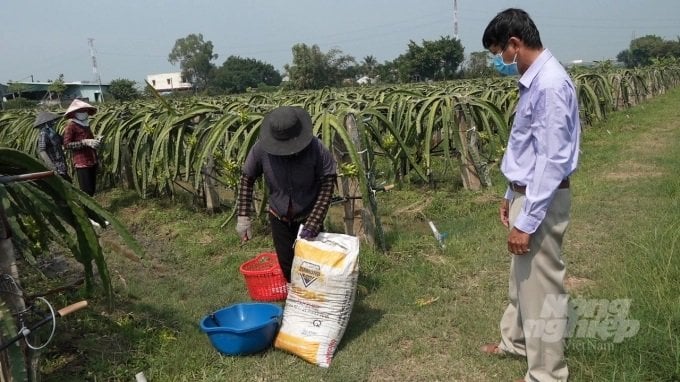
The dragon fruit garden is completely organically cultivated by Mr. Khanh's family. Photo: Tran Trung.
Mr. Khanh realized that the traditional production of dragon fruit is difficult to enter the market, the investment costs are high, and the risks are high. In 2019, on the 3 ha of land inherited from his parents, he cultivated the dragon fruits, deciding to "destroy and rebuild". From his unremitting efforts, in May 2021, his entire area of dragon fruit was granted a planting area code and certified to meet Global GAP standards.
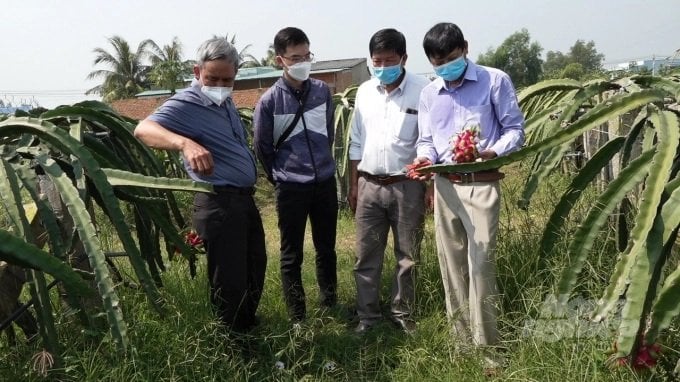
Mr. Khanh introduced organic dragon fruit to his partners. Photo: Tran Trung.
Taking us to the green, blooming dragon fruit garden, Mr.Khanh shared that everyone knows that growing organic dragon fruit will open the opportunity for new markets, but implementation is not easy. Currently, the prices of microbial organic fertilizers and plant protection drugs have all increased, the drug content announced on the label is also incorrect and there is a delay in time. If not careful, the harvested dragon fruits will not meet the standards and are returned. Therefore, in the production process, it is necessary to guarantee the regulations of fertilizers and pesticides and ensure a safe isolation period. To realize this, Mr.Khanh applied digital farming to manage production logs, growing area codes, and product traceability. At the same time, he keeps up with market fluctuations to regulate production.
“Despite the complicated effects of Covid-19, all the family's dragon fruit is guaranteed offtake at VND25,000/kg. This is thanks to a systematic and scientific production, fully meets the criteria and standards, and an import-export partner company in Can Tho” Mr. Khanh revealed.
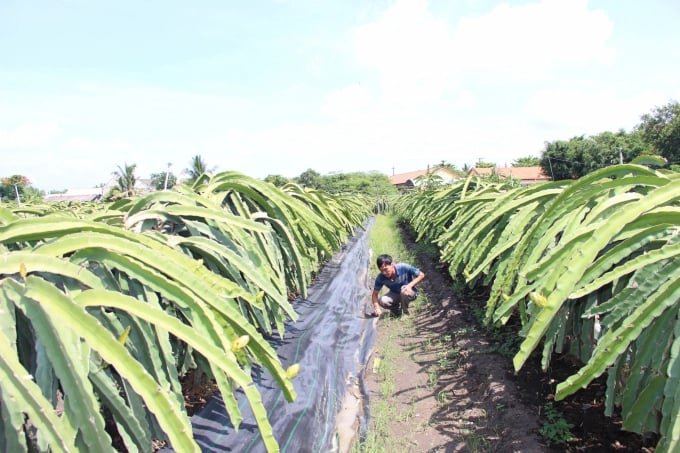
The organic dragon fruit garden of Long Hoi dragon fruit cooperative. Photo: Tran Trung.
Similarly, thanks to planting area codes, good agricultural production practices, and applying CNC to production, most members of Long Hoi dragon fruit cooperative, An Luc Long commune produced according to VietGAP standards. The cooperative is still thriving despite the Covid-19 pandemic and the recent order 248 and order 249 from the Chinese Customs.
According to Mr. Truong Minh Trung - Director of Long Hoi dragon fruit cooperative, since 2020, due to the complicated weather situation plus the ongoing Covid-19 pandemic, followed by the "Zero Covid" policy, dragon fruit as well as other agro-products of Vietnam have dropped in price and are difficult to consume. However, the cooperative’s dragon fruits still sell at a high price thanks to production according to the VietGAP process and have an annual offtake contract.
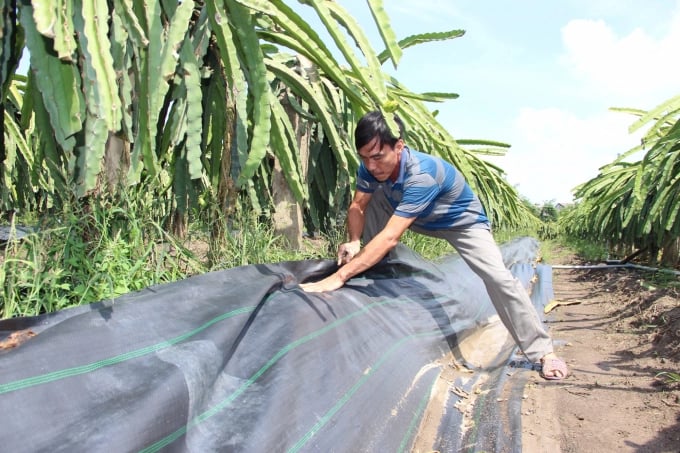
Using silver to cover corners and limit weeds and pests is one of the solutions for organic CNC dragon fruit cultivation of Long Hoi dragon fruit cooperative. Photo: Tran Trung.
“The granting of area codes for farming cooperatives that apply CNC to production save labor and input materials, reduce production costs and produce clean agro-products that are well received by the market. Currently, I receive dozens of calls every day to order dragon fruits from businesses inside and outside the province, but sometimes I have to refuse due to the limited output of the cooperative. In the future, if businesses want to cooperate and sign a clear contract, the cooperative will not hesitate to expand its members and farming area", said Mr.Truong Minh Trung.

“The granting of area codes for farming cooperatives that apply CNC to production save labor and input materials, reduce production costs, and produce clean agro-products that are well received by the market", said Mr.Truong Minh Trung. Photo: Tran Trung.
Along with growers, many businesses in Long An province are aware of the difficulties of the Chinese market. They have standardized their warehouses and completed the procedures and requests for business codes, and warehouse codes, and ensured goods transition. Hoa Cuong Fruit Import Export Co., Ltd is the unit with the largest dragon fruit warehouse system in Chau Thanh district. Currently, the company still regularly exports over 150 tons of goods to China daily. Although it is over 25% lower than usual, the company's operation is still stable.
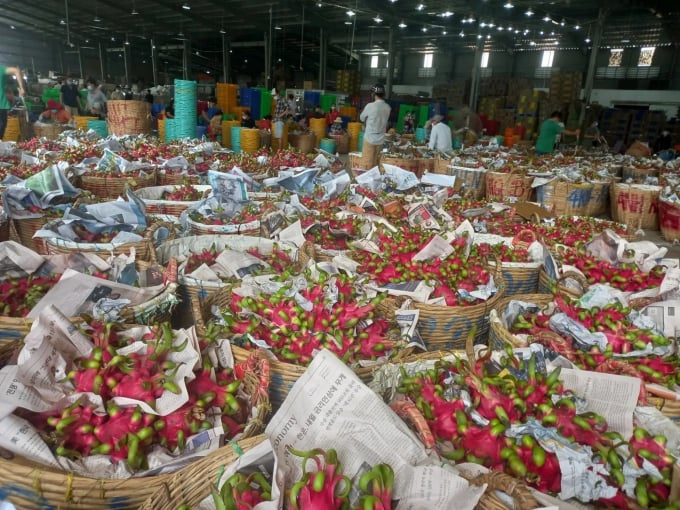
Hoa Cuong Fruit Import-Export Co., Ltd collects goods to prepare to export to the China market. Photo: Tran Trung.
Ms. Vo Thi Thu Han - Deputy Director of Hoa Cuong Fruit Import Export Co., Ltd. added that the export market of the business mainly exports to China. When China tightens imports, the company already standardized legal documents. However, the planting area code, in principle, is considered by the state management agency and granted by the Chinese Customs. Not all growers are granted a planting area code. Consequently, businesses limit the number of goods exported.
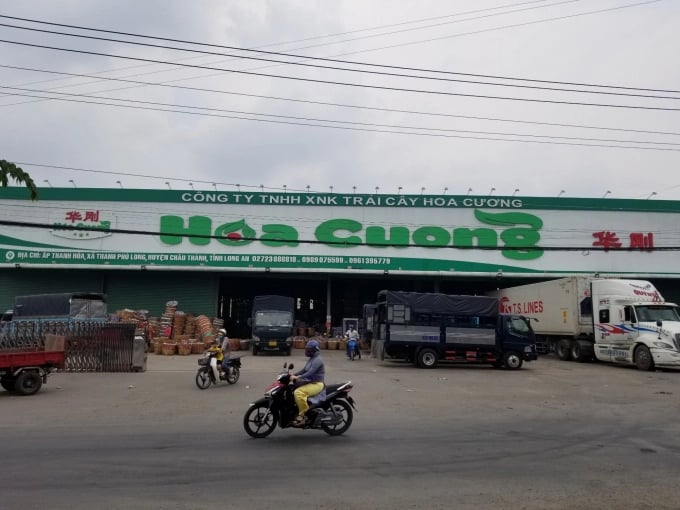
Hoa Cuong Fruit Import Export Co., Ltd is the unit with the largest dragon fruit warehouse system in Chau Thanh district. Photo: Tran Trung.
“In general, the company also tries to purchase as much dragon fruit as possible. Specifically, when Vietnam’s goods are suddenly banned from border gates, to share difficulties with farmers, the company still supports gardeners with 1 batch with the price of VND3000/output that they have registered to sell to the company. The company wants the local agricultural industry to work together with growers. Growers will then pay attention to building the right procedures for the production process to receive the planting area code. Their export of dragon fruit will be unrestricted", Ms. Han said.
According to Long An Department of MARD, to receive a planting area code, agro-products are produced according to a certain process with requirements of the cultivation area, the cultivation conditions, records, garden’s hygiene, pest composition in the production area, requirements on plant protection drugs. The development of the planting area code helps to trace the origin and ensure the strictest conditions on food safety. This development also changes the awareness and actions of people, businesses, and managers in the area of improving productivity, area, quality, and output for products. Consequently, every year, the Department has written requests to localities to strengthen and enhance the quality of the granting of planting area codes and agro-product packing establishments codes to serve production and export. As of April 2021, Long An province has 54 area codes for growing dragon fruits with a total area of more than 9,800 ha and an output of more than 47,000 tons/year.
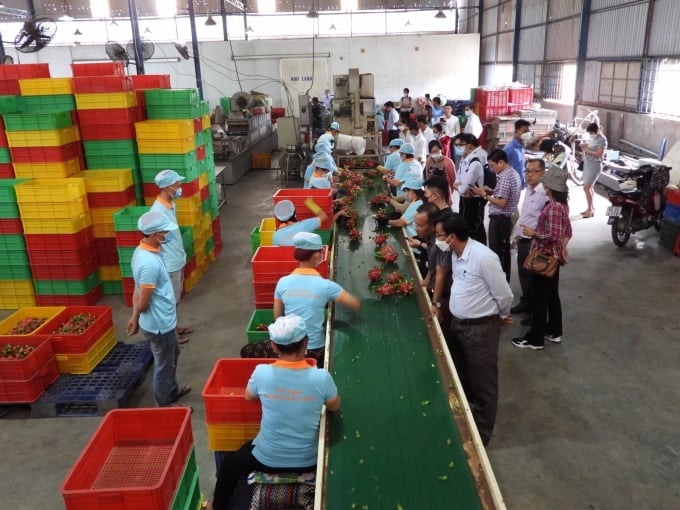
The delegation of the SPS Vietnam office visited and worked at dragon fruit export production facilities in Long An. Photo: Tran Trung.
Director of the Long An Department of MARD Nguyen Thanh Truyen added that with the situation of export markets becoming increasingly challenging, Long An province has to upgrade the dragon fruit growing area. At the end of last year, agro-products circulation congested at the Chinese market’s border gate. Having experienced this, at the beginning of 2022, the Department of MARD strengthened propaganda and supported farmers to register area codes for fruit trees in combination with businesses and cooperatives to consume products. At the same time, the Department also issued codes to establishments purchasing and preliminarily processing fruit, creating the most favorable conditions for export.
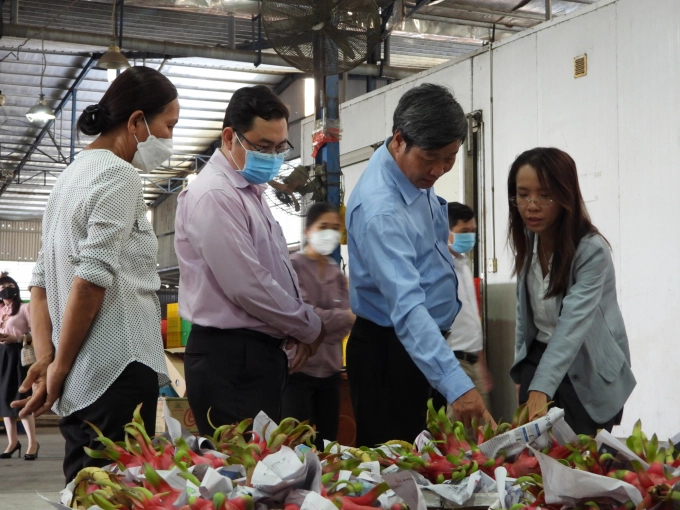
With the initiative of the government, businesses, cooperatives, and farmers, dragon fruit gradually regained its position in the Mekong Delta. Photo: Tran Trung.
“The province has planned to grant planting area codes and re-plan the area for growing dragon fruits, associated with standards, quality. The province will not expand the dragon fruit growing area. In the coming time, the agricultural industry will mainly improve the quality and standards of dragon fruit. In addition, the Department strengthens supervision of the management and use of the area code for growing dragon fruit, dragon fruit packing code granted following the regulations of MARD. The Department will also strictly handle violations and pay attention to establishments that received export codes to China. In addition, strengthen the management of food quality and safety; ensure strict control of the use of chemicals, stimulants, weight gainers... in the entire chain of dragon fruit production and consumption," said Mr. Nguyen Thanh Truyen.
According to MARD, in May 2022, units of the Ministry have granted 144 area codes for growing mango, dragon fruit, seedless lemon, durian, chili, and black jelly; 3 packing facility codes for fruits such as bananas, lychees... exporting to the Chinese market. Currently, the country has 3,646 planting area codes, and 1,800 packing facility codes for all kinds of fresh fruit for export, with 50/63 provinces/cities receiving planting area codes.
Particularly, dragon fruits of the three provinces of Binh Thuan, Long An, and Tien Giang currently have 292 growing area codes and 1,100 packing facility codes, with a total area of about 44,231 ha that received codes. Consequently, the growing area code and packaging facilities for dragon fruit have met the export needs of businesses to China and other markets.
Translated by Hoang Duy
![Turning wind and rain into action: [4] Bringing climate bulletins to remote and isolated areas](https://t.ex-cdn.com/nongnghiepmoitruong.vn/608w/files/linhnhp/2025/06/14/1152-z6704423696987_15fd32ffc26d590d204d520c9dac6786-nongnghiep-151141.jpg)
(VAN) The Vietnam Agriculture and Nature Newspaper interviewed Mr. Vu Thai Truong, Acting Head of Climate Change and Environment at UNDP Vietnam, to gain deeper insight into how climate bulletins are delivered to farmers.

(VAN) In Tien Giang, a high-tech shrimp farm has developed a distinctive energy-saving farming model that has yielded promising results.
![Turning wind and rain into action: [3] 300.000 farmers benefit from agro-climatic bulletins](https://t.ex-cdn.com/nongnghiepmoitruong.vn/608w/files/news/2025/06/12/e5a48259d6a262fc3bb3-nongnghiep-125122.jpg)
(VAN) The agro-climatic bulletin has become a valuable tool for farmers in the Mekong Delta. After more than five years of implementation, the initiative is gradually being expanded nationwide.
![Turning wind and rain into action: [2] Providing forecasts to the people](https://t.ex-cdn.com/nongnghiepmoitruong.vn/608w/files/news/2025/06/12/e5a48259d6a262fc3bb3-nongnghiep-103927.jpg)
(VAN) In addition to improving the quality of hydrometeorological forecasts, putting forecast bulletins into practical use is crucial for production and disaster prevention.

(VAN) Blue carbon is receiving attention for its rapid absorption capacity and vast potential. It represents a promising nature-based solution to respond to climate change.
/2025/06/11/3507-1-161904_583.jpg)
(VAN) Seagrass beds and coral reefs serve as 'cradles' that nurture life in the ocean depths, creating rich aquatic resources in Vietnamese waters.
![Turning wind and rain into action: [1] Forecasting for farmers](https://t.ex-cdn.com/nongnghiepmoitruong.vn/608w/files/news/2025/06/11/e5a48259d6a262fc3bb3-nongnghiep-111919.jpg)
(VAN) Weather is no longer just a matter of fate. Forecasts have now become an essential companion for farmers in every crop season.